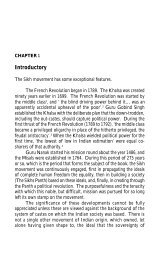Fundamentalism and the Sikh Religious Tradition by T.N. Madan
Fundamentalism and the Sikh Religious Tradition by T.N. Madan
Fundamentalism and the Sikh Religious Tradition by T.N. Madan
You also want an ePaper? Increase the reach of your titles
YUMPU automatically turns print PDFs into web optimized ePapers that Google loves.
objectionable, had similar criticism been levelled against o<strong>the</strong>r religious traditions as<br />
well. "<br />
It is incorrect that it is <strong>the</strong> conflict of world views that has led to <strong>the</strong> Bluestar<br />
attack. Indian Secularism has never been Secularism of <strong>the</strong> type understood in <strong>the</strong> West.<br />
Second, in operation, it has many a time been only an expression of Hindu orthodoxy.<br />
Third, so far as <strong>the</strong> combination of religion <strong>and</strong> politics <strong>and</strong> <strong>the</strong> execution of <strong>the</strong> <strong>Sikh</strong><br />
Morchas from <strong>the</strong> precincts of <strong>the</strong> Golden Temple arc concerned, <strong>the</strong>se were never<br />
objected to ei<strong>the</strong>r <strong>by</strong> <strong>the</strong> Mahatma, or, later after Independence, at <strong>the</strong> time of Punjabi<br />
Suba agitation or during <strong>the</strong> Emergency imposed <strong>by</strong> Indira G<strong>and</strong>hi. And, as to <strong>the</strong> issues<br />
for which <strong>the</strong> Akali Party, struggled, those were purely socio-political, being <strong>the</strong> result of<br />
uncalled for <strong>and</strong> unconstitutional, but overt discrimination made <strong>by</strong> <strong>the</strong> State against <strong>the</strong><br />
<strong>Sikh</strong> community.<br />
At times <strong>Madan</strong> asserts what suits his argument, howsover, irrational, it may be.<br />
Punjabi language st<strong>and</strong>s recognized as one of <strong>the</strong> fourteen languages in <strong>the</strong> Indian<br />
Constitution. And, yet, he cannot conceal his bias, when he says that "<strong>the</strong> argument<br />
(about necessary secular basis of language) has not entirely been convincing, although<br />
<strong>the</strong> <strong>Sikh</strong> holy book is written in Gurmukhi." For him, Punjabi is hardly a language <strong>and</strong><br />
<strong>the</strong> dem<strong>and</strong> for a Punjabi-speaking state was not justified, although he is well aware that<br />
everywhere else <strong>the</strong> division of India had been made on <strong>the</strong> linguistic basis. On <strong>the</strong> o<strong>the</strong>r<br />
h<strong>and</strong>, he has hardly a word of condemnation, when almost <strong>the</strong> entire Hindu community in<br />
Punjab collectively resorts to making false public statements about <strong>the</strong>ir mo<strong>the</strong>rtongue.<br />
Instead of being critical of such public conduct, he appears quite unconcerned except for<br />
saying that <strong>the</strong>re is considerable truth in it. Minority positions being what <strong>the</strong>y are <strong>the</strong><br />
world over, <strong>the</strong> <strong>Sikh</strong>s have never denied that a Punjabi Suba will give <strong>the</strong>m a sense of<br />
security. But, <strong>the</strong> studied effort of <strong>the</strong> Centre to deny it, <strong>the</strong> Punjabi Hindus' making an<br />
exhibition of public misconduct, <strong>and</strong>, <strong>the</strong>reafter, <strong>the</strong> Centre's taking it as <strong>the</strong> truthful basis<br />
of <strong>the</strong> division of Punjab, could not but alarm <strong>the</strong> <strong>Sikh</strong>s about <strong>the</strong> euphemistic Secularism<br />
of <strong>the</strong> Centre.<br />
It is also incorrect for <strong>Madan</strong> to say that in 1981 at <strong>the</strong> <strong>Sikh</strong> Educational<br />
Conference <strong>the</strong> call for Khalistan was given. In fact, even till June, 1984 <strong>the</strong>re was never<br />
any idea of Khalistan in any political group or party, not even in <strong>the</strong> case of<br />
Bhindranwala or <strong>the</strong> <strong>Sikh</strong> Students Federation. This is evident from <strong>the</strong> statements both<br />
of Nayyar <strong>and</strong> Ravi about <strong>the</strong>ir talks with Bhindranwala in May, 1984, <strong>and</strong> <strong>the</strong> statement<br />
of Rajiv G<strong>and</strong>hi.<br />
Again, on <strong>the</strong> one h<strong>and</strong>, <strong>Madan</strong> says that <strong>the</strong> Tenth Master invested <strong>the</strong> Guru<br />
Granth with Guruship. Later, he says that Guruship of Guru Granth is an evolutionary<br />
growth. Nor has <strong>Madan</strong>'s statement that <strong>the</strong> text of <strong>the</strong> Guru Granth was finalised in<br />
1962, any factual basis. It is a historical fact that in early 18th century, <strong>the</strong> dispute<br />
between <strong>the</strong> B<strong>and</strong>ai Khalsa <strong>and</strong> <strong>the</strong> Tatt Khalsa was resolved following <strong>the</strong> hukm (hymn)<br />
from <strong>the</strong> Guru Granth. Similarly, <strong>Madan</strong> concedes that <strong>the</strong> entry of some <strong>Sikh</strong>s (Mazhbis)<br />
to <strong>the</strong> Golden Temple was decided following a hymn from <strong>the</strong> Guru Granth Sahib. In<br />
both <strong>the</strong> cases it was <strong>the</strong> meanings of <strong>the</strong> hymns that prevailed <strong>and</strong> not <strong>the</strong> symbols.<br />
Hence <strong>the</strong> incongruity of <strong>Madan</strong>'s statements that Guru Granth is a classic example of<br />
supremacy of symbol over substance. We have explained that unlike as in <strong>the</strong> Vedic<br />
religion, where only <strong>the</strong> meticulous performance of <strong>the</strong> ritual or repetition of <strong>the</strong> mystic
















